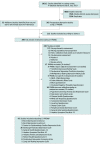Assessment of Patient-Reported Outcome Measures for Maternal Postpartum Depression Using the Consensus-Based Standards for the Selection of Health Measurement Instruments Guideline: A Systematic Review
- PMID: 35749118
- PMCID: PMC9233232
- DOI: 10.1001/jamanetworkopen.2022.14885
Assessment of Patient-Reported Outcome Measures for Maternal Postpartum Depression Using the Consensus-Based Standards for the Selection of Health Measurement Instruments Guideline: A Systematic Review
Erratum in
-
Error in Affiliations.JAMA Netw Open. 2022 Aug 1;5(8):e2229924. doi: 10.1001/jamanetworkopen.2022.29924. JAMA Netw Open. 2022. PMID: 35969405 Free PMC article. No abstract available.
Abstract
Importance: Maternal depression is frequently reported in the postpartum period, with an estimated prevalence of approximately 15% during the first postpartum year. Despite the high prevalence of postpartum depression, there is no consensus regarding which patient-reported outcome measure (PROM) should be used to screen for this complex, multidimensional construct.
Objective: To evaluate psychometric measurement properties of existing PROMs of maternal postpartum depression using the Consensus-Based Standards for the Selection of Health Measurement Instruments (COSMIN) guideline and identify the best available patient-reported screening measure.
Evidence review: This systematic review followed the Preferred Reporting Items for Systematic Reviews and Meta-analyses (PRISMA) reporting guideline. PubMed, CINAHL, Embase, and Web of Science were searched on July 1, 2019, for validated PROMs of postpartum depression, and an additional search including a hand search of references from eligible studies was conducted in June 2021. Included studies evaluated 1 or more psychometric measurement properties of the identified PROMs. A risk-of-bias assessment was performed to evaluate methods of each included study. Psychometric measurement properties of each PROM were rated according to COSMIN criteria. A modified Grading of Recommendations Assessment, Development, and Evaluation approach was used to assess the level of evidence supporting each rating, and a recommendation class (A, recommended for use; B, further research required; or C, not recommended) was given based on the overall quality of each included PROM.
Findings: Among 10 264 postpartum recovery studies, 27 PROMs were identified. Ten PROMs (37.0%) met the inclusion criteria and were used in 43 studies (0.4%) involving 22 095 postpartum women. At least 1 psychometric measurement property was assessed for each of the 10 validated PROMs identified. Content validity was sufficient in all PROMs. The Edinburgh Postnatal Depression Scale (EPDS) demonstrated adequate content validity and a moderate level of evidence for sufficient internal consistency (with sufficient structural validity), resulting in a recommendation of class A. The other 9 PROMs evaluated received a recommendation of class B.
Conclusions and relevance: The findings of this systematic review suggest that the EPDS is the best available patient-reported screening measure of maternal postpartum depression. Future studies should focus on evaluating the cross-cultural validity, reliability, and measurement error of the EPDS to improve understanding of its psychometric properties and utility.
Conflict of interest statement
Figures
Comment in
-
Perinatal Depression and Beyond-Implications for Research Design and Clinical Management.JAMA Netw Open. 2022 Jun 1;5(6):e2218978. doi: 10.1001/jamanetworkopen.2022.18978. JAMA Netw Open. 2022. PMID: 35749121 No abstract available.
References
-
- National Center for Health Statistics, Centers for Disease Control and Prevention. First data released on maternal mortality in over a decade. Accessed May 10, 2021. https://www.cdc.gov/nchs/pressroom/nchs_press_releases/2020/202001_MMR.htm
-
- CDC Foundation. Building US Capacity to Review and Prevent Maternal Deaths. Report From Nine Maternal Mortality Review Committees. Accessed May 10, 2021. https://www.cdcfoundation.org/sites/default/files/files/ReportfromNineMM...
Publication types
MeSH terms
LinkOut - more resources
Full Text Sources
Medical
Miscellaneous


